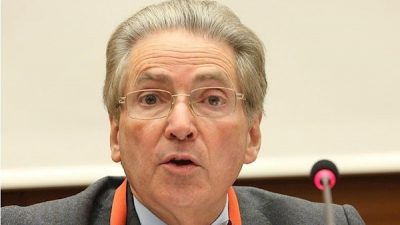Human Rights Experts Call for Withdrawal of Biased UN Report on Nicaragua

All Global Research articles can be read in 51 languages by activating the Translate Website button below the author’s name.
To receive Global Research’s Daily Newsletter (selected articles), click here.
Click the share button above to email/forward this article to your friends and colleagues. Follow us on Instagram and Twitter and subscribe to our Telegram Channel. Feel free to repost and share widely Global Research articles.
***
Alfred de Zayas, former UN Independent Expert on International Order, has joined other human rights specialists in condemning an “expert” report on Nicaragua published on March 2nd as being unprofessional, biased, incomplete and concocted to justify further coercive sanctions that will damage Nicaragua’s economy. Such unilateral coercive measures have been condemned by the General Assembly year after year, most recently in Resolution 77/214 of December 2022 and by the Human Rights Council in Resolution 49/6.
The report, by a “group of experts” selected by the UN Human Rights Council, claims that Nicaragua’s government has committed “crimes against humanity.” The “experts” even go beyond their mandate and recommend further economic sanctions. Most of their unsubstantiated allegations date to 2018, but the report also falsely contends that the abuses have continued since that period. It is due to be considered by the Council in its session on April 3rd and 4th.
A petition organized by the Nicaragua Solidarity Coalition (in English and Spanish) demands that the UN withdraw the group’s “spurious, unprofessional report.” It has so far been signed by 54 different organizations and by 307 individuals across the world. Signatories include these prominent individuals:
- Professor Alfred de Zayas, Geneva, former UN Independent Expert on International Order, author of Building a Just World Order, Clarity Press 2021
- Richard Falk, Professor of International Law Emeritus, Princeton University
- Daniel Kovalik, Adjunct Professor of Law, University of Pittsburgh, and author of numerous books, including Nicaragua: A History of US Intervention and Resistance.
- Sara Flounders, International Action Center, editor of Sanctions: A Wrecking Ball in a Global Economy, by the SanctionsKill Campaign
- Camilo Mejía, former Amnesty International “prisoner of conscience,” Miami, Florida
- S. Brian Willson, Viet Nam veteran, author/activist and lawyer, Nicaragua
- Ajamu Baraka, Black Alliance for Peace human rights activist
- Ann Wright, US Army Colonel (Ret) and former US Diplomat
The petition says that the report:
- is based on material from only one side in what was a serious and prolonged conflict in 2018, despite the UN’s requirement to examine “all alleged human rights violations and abuses committed in Nicaragua.”
- ignores very substantial documentation submitted to both the UN and the OAS by the Nicaraguan government since 2018.
- despite claiming to be “victim-centered”, completely fails to address the enormous abuses against the human rights of thousands of Nicaraguans perpetrated by the opposition during the violent attempted coup.
- makes allegations that are demonstrably wrong and do not withstand a simple checking of the facts.
- was presented in a sensational and unprofessional manner, making unfounded and damaging slurs against the Nicaraguan people and their government.
Endorsing the call for the report to be withdrawn, Alfred de Zayas said:
“The UN Human Rights Council has a sacred obligation to the Nicaraguan people and the world to be rigorously objective, avoid politicization and hyperbole. This is not the first time that a flawed report has been submitted to the HR Council. It should be withdrawn. The vocation of the HR Council is to make constructive proposals for the overall improvement of all human rights in Nicaragua, e.g. in the context of OHCHR advisory services and technical assistance. The HR Council should abide by its own Resolution 49/6 of 31 March 2022 and demand the immediate lifting of the illegal unilateral coercive measures that have already victimized the most vulnerable.”
Professor Daniel Kovalik of the University of Pittsburgh said:
“It is disturbing to me as a human rights practitioner that ‘human rights’ is being used as a pretext to justify imperial intervention and the economic strangulation of a nation attempting to go its own independent and sovereign path. This runs counter to every basic tenet of international law.”
In addition to the petition, the Nicaragua Solidarity Coalition has sent a detailed critique of the report to the UN Human Rights Council and to the “group of experts.” It plans to continue sending evidence which contests the report’s findings.
*
Note to readers: Please click the share button above. Follow us on Instagram and Twitter and subscribe to our Telegram Channel. Feel free to repost and share widely Global Research articles.

